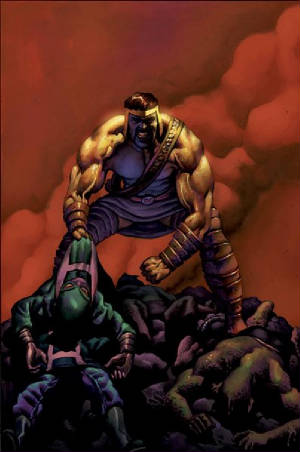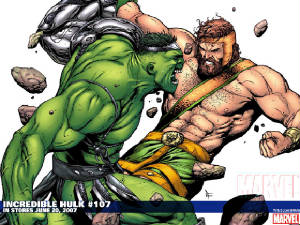|
|
 |
                      |
 |
 |
 |
|
Hercules
|
|
 |
 |

Bio
|
 |
|
Hercules is the son of Zeus, king of the gods of Olympus, and Alcmena, a mortal woman who lived about three thousand years ago. Recognizing the need for a son
who would be powerful enough to defend both the Olympian gods and humanity from future dangers he foresaw, Zeus seduced Alcmena
in the guise of her husband, King Amphitryon of Troezen. Thanks to Zeus's enchantment, Hercules was born with the potential
for extraordinary strength, which he first displayed before he was even one year old by strangling two serpents which attacked
him. As an adult, Hercules is best known for his celebrated Twelve Labors, which were performed in part to prove his worthiness
for immortality to Zeus. (One of these Labors, the cleansing of the Aegean Stables, was actually performed by the Eternal called the Forgotten One, who was sometimes mistaken for Hercules.)
In the course of these Labors, Hercules provoked the wrath of three immortals who remain his enemies
to this day. By slaughtering the man-eating Stymphalian Birds, he enraged the war god Ares, to whom they were sacred. In temporarily capturing Cerberus, the three-headed hound that serves as guardian
to the Olympian underworld (not to be confused with the shape-shifting giant of the same name), Hercules offended Pluto, the lord of that realm. By killing the Nemean Lion, the Hydra, and other creatures spawned by the inconceivably
grotesque and powerful monster Typhoeus, Hercules gained the bitter enmity of Typhon, the immortal humanoid offspring of Typhoeus and a Titaness.
However, it was the centaur Nessus who caused Hercules's mortal demise. Nessus kidnapped Hercules's
wife Deianeira, whereupon Hercules shot him with an arrow. Feigning a wish to make amends, the dying centaur told Deianeira
how to make a love charm from his allegedly enchanted blood, aware that it was now tainted with the lethal poison of the Hydra,
in which Hercules had dipped his arrows. Some time after Nessus's death, Deianeira, distraught over her husband's latest infidelity,
rubbed the supposed love charm into Hercules's shirt. When Hercules's donned the shirt, the poison quickly worked and caused
Hercules great pain. In an attempt to end this pain, he built a funeral pyre for himself and set it ablaze. Zeus intervened
however, consuming the pyre with his thunderbolts and bringing Hercules to Olympus to be made a true immortal. In an alternate future of the 23rd century, Hercules is the sole survivor of the Olympians, after Zeus had decided
that the time had come for them to leave this plane of existence. Hercules then left Olympus to become the father to a new
race of gods.
|
 |
|
|
 |
 |
|
 |
 |
 |
|
 |

Real Name
Heracles
Identity
Publicly known; however, not all modern day Earth people believe Hercules is the actual Hercules of
myth.
Occupation
Adventurer
Citizenship
Greece
Place of Birth
Thebes, Greece
Known Relatives
Zeus (father), Alcmena (mother, deceased), Amphitryon (foster father, deceased), Iphycles (half-brother, deceased), Neptune (Poseidon) and Hades(Pluto) (uncles), Ares, Apollo, Hermes, Hephaestus (half-brothers), Venus (Aphrodite), Athena, Artemis (half-sisters)
Group Affiliation
Gods of Olympus; formerly Secret Avengers, Avengers, Champions (of Los Angeles)
Education
Unrevealed
Height
6'5"
Weight
325 lbs.
Eyes
Blue
Hair
Dark brown
Powers
Hercules's principal power is his superhuman strength. Hercules's strength is well in excess of the "Class
100" Level (able to lift/press in excess of 100 tons), making him, one of the strongest beings in the Marvel Universe. Hercules
has highly developed leg muscles, although they do not match those of the Hulk. Hercules can make a standing high jump of
at least 100 feet in Earth's gravity.
Hercules is also an Olympian thereby being an immortal, and as true immortals, the Olympian gods do not age and are not
susceptible to disease. Although they can be wounded in battle, they cannot die by any conventional means, and have a rapid
healing rate. Hercules has a greater resistance to physical injury than any other Olympian god except for Zeus, and possibly
Neptune and Pluto. Hercules is virtually tireless. His supernaturally enhanced musculature produces no fatigue poisons. He
can even survive unprotected in the vacuum of space for a brief period of time. Only an injury of such magnititude that it
incinerated him or dispersed a major portion of his bodily molecules could kill Hercules. In at least some such cases, Zeus
or one of the other gods might still be able to resurrect him.
Abilities
As Olympus's greatest hero, Hercules is highly expert in traditional means of hand-to-hand combat, as well as in wrestling. Hercules
is also very highly skilled in ancient Greek athletic feats such as the discus and hammer throws.
Weapons
Hercules was famed in ancient Greece for his mastery of the bow and arrow, but today, because of his
bitter memories of Nessus's treachery and Deianeira's suicide, he prefers not to use them. Before he came to live on Olympus, Hercules's favorite weapon was his large wooden club. The club was supplanted by his current weapon, his Golden Mace, which
is not actually made of gold but was forged by the god Hephaestus from enchanted adamantine, the legendary substance after
which Dr. Myron MacLain named his artificially created adamantlure. The Mace is therefore virtually indestructible, and has
survived direct blows from Thor's hammer.
First Appearance
THOR ANNUAL #1

Search Engine Optimization and SEO Tools
 |
|
|






|
|






|
|